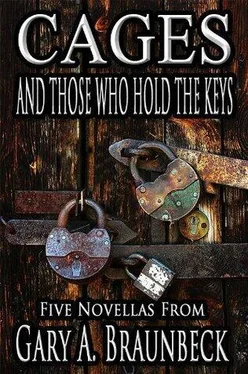We had four new faces tonight, a young mother (who couldn’t have been older than twenty-three), her two children (a boy, five or six; a girl, three years old tops), and their dog (a sad-ass Beagle with an even sadder face who was so still and quiet I almost forget he was there a few times until I nearly tripped over him). It breaks my heart to see a mother and her kids in a place like this. The Thanksgiving/Christmas period’s always the worst, and the most depressing. At least for me.
“That’s about all the excitement I can stand for one night,” said Ethel, the old black woman who mans the front door. She’s a volunteer from one of the churches—St. Francis—and sits here every weeknight from seven p.m. until eleven, greeting folks as they come in, handing out all manner of pamphlets, answering questions, and you-bet’cha happy to take any donations; she’s got a shiny tin can at the edge of her folding card table marked in black letters for just such a purpose.
I smiled at her as I cleared away some more of the empty plastic plates left on the various tables. “But you gotta admit, there aren’t many places like this that offer a free floor show with dinner.” “Mind your humor there; it’s not very Christian to make light of others’ woes.” “Then how come you grinned when I said that?” “That was not a grin. I…had me some gas.” “Uh-huh.”
“That’s my story and I’m sticking to it.” She winked at me, then looked out at the guests. “I don’t mind doin’ the Lord’s work, not at all, and Heaven knows these poor people need all the help they can get, but I swear, sometimes....” She squinted her eyes at nothing, trying to find the right way to express what she was thinking without sounding uncharitable.
“ Sometimes ,” I said. Then winked back at her. “We can leave it at that and it’ll be our little secret.”
She laughed as she dumped the contents of the DONATIONScan onto the table and began counting up the coins. “Oh, bless me, will wonders never cease? It looks like we might’ve took in a small fortune tonight. Why there must be all of—” She counted out a row of dimes, then a few nickels and pennies. “—three dollars and sixteen cents here! Might put us in a higher tax bracket.”
“I’m sorry it isn’t more,” I said, digging into my pocket and coming up with thirty-three cents, which I promptly handed over. If you’ve got spare change, it goes into Ethel’s til or. She. Will. Get. You.
“Always remember, Sam,” she said to me as she took the change, “what the Good Book says: ‘What we give to the poor is what we take with us when we die.’” “Then I’m screwed to the wall.” Her eyes grew wide at my language. I looked down at my feet. “I’m sorry.” “I’m going to chalk that up to your being tired and let it go, Samuel.”
“Yes, ma’am.” Both Ethel and the Reverend (who’ve looked out for my own good as long as I’ve been here) call me “Samuel” when they’re irked at me about something. I prefer “Sam.” “Samuel” always sounded to me like the noise someone makes trying to clear their sinuses.
Ethel picked up her purse and took out a five-dollar bill and some change, adding it to the til. “I have one rule for myself, Sam—I will not, absolutely not hand the Reverend less than twenty dollars at the end of each week.”
“How often do you have to make up the difference?”
She shrugged. “That’s my and the Good Lord’s business, you needn’t bother yourself worryin’ over it.” Then she gave me a conspiratorial wink. “Maybe we’ll soon have enough saved up to get the basement wall fixed.”
“Be still my heart,” I said.
Ethel was referring to the east wall in the men’s shower room. For the last several weeks, more and more of the tile and grouting had fallen out, and the cement foundation on that side was starting to crumble. Because of an unusually damp autumn, and with the almost non-stop rain of the past week or so, the soil behind the weakening cement started oozing through the gaps, slowly transforming everything into a muddy wall that was pushing out what tile still held its ground (it didn’t help matters that there was a leak in one of the pipes running into the showers). I’d been down there with the Reverend earlier that day, piling bags of sand, wooden crates filled with canned food, and even a couple of pieces of old furniture against it. It was a fight we were going to lose unless one of the contractors the Reverend had been guilt-tripping since spring threw up their hands in surrender and donated the time, manpower, and materials to repair it. I didn’t think Ethel’s twenty dollars a week was going to help much, regardless of how often she’d been making up the difference—something I suspected she really couldn’t afford to do.
I was thinking out loud as I watched Ethel slide the money into a brown envelope with the rest of the week’s donations. “I worry that if something isn’t done soon, that whole side’s going to cave in and we’ll have a helluva mess down there.”
Ethel shook her head. “My, my—the mouth on you this evening!”
“I’m sorry—again.” I rubbed my eyes. “I haven’t been sleeping too well the past couple of nights.”
“Which means most of the week, unless I miss my guess—don’t bother denying it, either. I could pack for a month’s vacation in the Caribbean with those bags under your eyes. Still taking your medication like the doctor prescribed?” Meaning my anti-depressants.
“Yes.”
“Still going to your weekly appointments?” Meaning Dr. Ellis, the psychiatrist who prescribes my anti-depressants.
“They’re twice a week—and, yes, I’m still going.”
She tilted her head to the side, puzzling. “Hmm. How about your diet? Your appetite been okay, Sam? Been eating regular?”
I nodded. “Yes, ma’am. I’m not particularly worried about anything, I haven’t been drinking too much caffeine or anything like that...I have no idea why I can’t sleep.”
“Bad dreams, maybe?”
Before I could answer, a voice behind me and said, “Terrible, just terrible,” loudly enough to make me jump, nearly dropping the stack of plates I’d gathered.
“Hello, Timmy,” said Ethel.
“Terrible, just terrible.”
I did a spin-dip-balance-and-catch routine with the plates that Buster Keaton would have been proud of, then set everything on Ethel’s table in case Timmy or someone else decided to test my reflexes again. “You shouldn’t sneak up on me like that,” I said to him, and was immediately sorry for the way I said it because Timmy got this look in his eyes like he was going to start crying. “Oh, hey, I’m sorry, Timmy. I’m not mad or anything, I didn’t mean to snap at you like that.” I put my hand on his shoulder and gave it a little squeeze. “Forgive me?”
Timmy is one of the more-or-less permanent residents here. The Reverend never makes anyone leave if they don’t want to or have no place else to go. The city council gives him no end of grief about this come the yearly budget meetings, but like every other city body and official in Cedar Hill, they don’t push it too far; it’s all for show, to save face. I don’t know what it is about the Reverend that makes them always back down, but I’m grateful for it, as are the permanent residents like Timmy.
Timmy is something of a walking, talking question mark to all of us. Nobody but the Reverend knows his last name, his story, or even if he’s from Cedar Hill. He never says anything more than “Terrible, just terrible,” to anyone else. But he’s courteous, and quiet, and clean.
He also sees things.
I found out from the Reverend that Timmy suffers from gradual and irreversible macular degeneration. The result is, you see things that aren’t there. In Timmy’s case, these visual hallucinations are pretty harmless: waiters, dancing animals, buildings that have been gone for thirty years, stuff like that. Timmy talks to the Reverend and only to the Reverend. The rest of us make do with Terrible, just terrible —but you’d be surprised how much he can convey with just those three words.
Читать дальше












